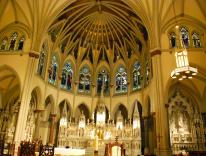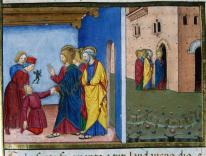Can a Catholic university legitimately take money from the likes of the Koch Brothers? This is not a hypothetical question. Many Catholic universities are implicated. But none more so than Catholic University of America, which—in the face of much criticism—has just doubled down with another $10 million donation from the Koch Foundation.
The original partnership with the Kochs, and the subsequent criticism, predates Pope Francis and Laudato si’. If the university’s arguments were weak back then, they are paper-thin now.
Just consider how the philosophy and business practices of the Koch Brothers goes directly against the authoritative teaching of Pope Francis. I will make three points in this regard.
First, the Kochs are avid libertarians, defenders of the unconstrained free market as the best route to prosperity. This ideology is simply not compatible with Catholic social teaching. In full continuity with his predecessors, Pope Francis condemns the notion of a “deified market” or a “magical conception of the market.” His point is that an economic system underpinned by self-interest and oriented toward profit maximization is simply incapable of delivering integral and sustainable development. It leads instead to an economy of exclusion, and is deaf to the cry of the earth and the cry of the poor. Pope Francis stresses that working for a just distribution of the fruits of the earth and human labor is a moral obligation—and for Christians, a commandment. “It is about giving to the poor and to peoples what is theirs by right,” he says. In other words, the universal destination of goods is a reality prior to private property. I have a feeling the Kochs would strenuously disagree with this. And this is no mere prudential disagreement. It is foundational and anthropological.
Second, the Kochs are among the leading funders and promoters of climate-change denialism. In Laudato si’, Pope Francis castigates those who are focused on “masking the problems or concealing their symptoms.” “There are too many special interests,” he says, “and economic interests easily end up trumping the common good and manipulating information so that their own plans will not be affected.” It almost seems like the pope is addressing the Kochs directly! Today, the stakes are especially high after the signing of the Paris Agreement by 196 nations last December. This agreement, which aims to phase out carbon emissions, was a major priority of Pope Francis. It explains the timing of the encyclical’s release, and Laudato si’ served as a moral charter for the agreement. But, almost alone in the world, the Paris agreement is being opposed by key U.S. political interests—because they are beholden to those very same vested interests condemned by Pope Francis.
Third, the business activities of the Kochs cannot be deemed ethical. In terms of assessing ethics in business, the best starting point is "The Vocation of the Business Leader," put out by the Pontifical Council for Justice and Peace. This document is currently being updated to encompass the wisdom of Laudato si’. And Pope Francis makes a compelling point about business ethics that bears repeating in this context. He notes that businesses profit from not paying the true costs of their activities. “Only when the economic and social costs of using up shared environmental resources are recognized with transparency and fully borne by those who incur them, not by other peoples or future generations,” he says, “can those actions be considered ethical.” It is hard to avoid the conclusion that the business model of the Koch Brothers is simply unethical, period.
Isn’t there something a little awry with a Catholic university partnering with unethical business interests that actively oppose key principles of Catholic social teaching? The university will undoubtedly argue that the money is untainted, and that the Catholic mission is unaffected. But this is treading in dangerous waters. It is well established that the Koch Foundations funds universities with a specific purpose in mind—the spreading of free-market values. And they seem to get quite a large return on their investment.
I believe this is also true at Catholic University’s business school. As an example of this, compare and contrast two recent conferences on Catholic social teaching: an orthodox one at Fordham University (in which—full disclosure—I participated) and a somewhat less orthodox one at Catholic University. (It is also no coincidence, by the way, that the Acton Institute is part of the Koch funding orbit).
One of the burning issues in university ethics today is divestment from fossil fuels. This cause is facing intense opposition by university administrators, and we have an uphill battle ahead of us—including among Catholic universities (with a few notable exceptions). But I am talking here about something more elemental—not about passive investing, but about active funding by some of the country’s most unethical business interests. This is a moral issue.
One of the highlights of the Fordham conference was a presentation by Luigi Zingales entitled “Do Business Schools Incubate Criminals.” One of Zingales’s main points was that the kind of the ideology of narrow self-interest promoted at business schools is a leading cause of ethical lapses. Is it too much to ask for Catholic business schools to set the bar a little higher, including by taking the teachings of Pope Francis a little more seriously?


